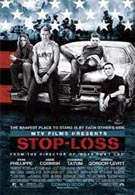I generally can’t stand the Wayans brothers or any of their movies. To their credit though, there is one thing they’ve done that makes me smile and oddly enough it happened in one of their worst movies ever, Don't Be a Menace to South Central While Drinking Your Juice in the Hood. Poking fun at the preachiness of all those repetitive ‘hood movies, Keenan Ivory played the role of a mailman, a guy who would appear during particular preachy parts and sardonically declare “MESSAGE!” I loved it.
With America's presidential elections mere months away, it’s to be expected that movies bashing the current administration’s handling of the war in Iraq would keep right on rolling out. What’s unexpected is just how moving, disturbing and eye-opening this particular politically charged film becomes. There’s an emotionally striking story with an important message being told, but it would have been far more effective in conveying its point without the cringe-inducing habit of abandoning significant moments in the story to get up on a soap box and whine.
Stop-Loss speaks directly to something that bothers me most about movies: when they decide to whip out a heavy handed message and beat the audience over the head with it. I strongly believe that if you’re good enough at telling your story then the story itself will convey the significance for you. There’s no need to ruin important dramatic scenes with petty dialogue and preachy monologues just to make sure that every idiot in the room knows exactly how you feel about every issue. It’s a giant, self-righteous pitfall and, like so many political thrillers and dramas before it, Stop-Loss’ and its writer/director Kimberly Peirce fall right into it over and over again.
The film's story centers on three soldiers who return home to Texas after a particularly traumatic tour of duty. Their small Texas ranch-town reeks of die-hard patriotic spirit in a stereotypical blind-to-the-truth red neck sort of way. It’s painted as the last place you’d expect to find someone who wouldn’t jump at the chance to join the Army and use a high powered rifle to shoot at people.
Sgt. Brandon King (Ryan Phillippe) has proven himself a national hero during his last tour. He’s glad to be back, and even more thrilled that his service is up and he can stay in his beloved Lone Star state for good. He shows up on his last day expecting to be released only to find that he’s been stop-lossed, a regulation that allows the military to retain personnel against their wishes for an additional tour of duty in times of war. After a series of particularly preachy scenes where he rants and raves – all the while making it very clear that he’s not scared to go back, just pissed off – King goes AWOL in an effort to find a way to get out of his situation.
King’s fellow soldier and life-long best friend Steve (Channing Tatum), is a character designed to play devil’s advocate to his buddy’s rebellion by voluntarily re-enlisting in the military and upping his stakes with the Army by considering a life-long career. It’s meant to be an honest choice on the part of the character, but Tatum isn’t convincing in the role. In fact, since Tatum’s past performances have never been particularly convincing as anything but a pretty boy, it feels like he was cast to make the career military man look that much more insincere. Why else would he end up in the midst of a cast that includes Joseph Gordon-Levitt, Ciarán Hinds, and Ryan Phillippe? Maybe to drag in all those young impressionable fangirls who have been drooling over him for years and are soon to be eligible to vote?
Joseph Gordon-Levitt proves to be the real shining star of the cast, giving a remarkable performance as Tommy Burgess, an impressionable young Private who loses his mentor in Iraq and returns home to a wife unable to cope with his traumatized behavior. Further derailed by his commanding officer’s disappearance he plummets into all kinds of emotional black holes, giving Gordon-Levitt juicy opportunities to show why he's such a great actor. Tommy’s story is also the only one not over-burdened by Peirce’s pedantics ,and he offersus a glimpse at how much impact the movie could have if it weren’t bent on polarizing its audience.
Your Daily Blend of Entertainment News
Before the credits roll the screen flashes statistics about the government’s use of the stop loss regulation. As I read I wanted to be startled into feeling sympathetic for these characters and their real-life counterparts, but I was too burnt to care. Peirce strips the story of its meaning with hammered-in, blatant Bush-bashing and it left me feeling as though I’d just walked out of a fanatic-filled political rally, not a change-your-world-view cinematic experience. It’s a shame, too. This message deserved better than to leave me wondering why Keenan wasn’t coming out in his mailman costume.

